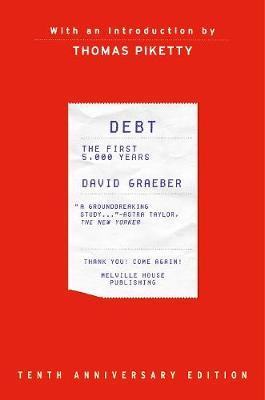Debt, Tenth Anniversary Edition: The First 5,000 Years

Debt, Tenth Anniversary Edition: The First 5,000 Years
The classic work on debt, now is a special tenth anniversary edition
Before there was money, there was debt.
Every economics textbook says the same thing: Money was invented to replace onerous and complicated barter systems--to relieve ancient people from having to haul their goods to market. The problem with this version of history? There's not a shred of evidence to support it. Here anthropologist David Graeber presents a stunning reversal of conventional wisdom. He shows that for more than 5,000 years, since the beginnings of the first agrarian empires, humans have used elaborate credit systems to buy and sell goods--that is, long before the invention of coins or cash. It is in this era, Graeber argues, that we also first encounter a society divided into debtors and creditors. Graeber shows that arguments about debt and debt forgiveness have been at the center of political debates from Italy to China, as well as sparking innumerable insurrections. He also brilliantly demonstrates that the language of the ancient works of law and religion (words like "guilt," "sin," and "redemption") derive in large part from ancient debates about debt, and shape even our most basic ideas of right and wrong. We are still fighting these battles today without knowing it. Debt: The First 5,000 Years is a fascinating chronicle of this little known history--as well as how it has defined human history. It shows how debt has defined our human past, and what that means for our economic future.
The classic work on debt, now is a special tenth anniversary edition with a new introduction by Thomas Picketty
Before there was money, there was debt.
Every economics textbook says the same thing: Money was invented to replace onerous and complicated barter systems--to relieve ancient people from having to haul their goods to market. The problem with this version of history? There's not a shred of evidence to support it. Here anthropologist David Graeber presents a stunning reversal of conventional wisdom. He shows that for more than 5,000 years, since the beginnings of the first agrarian empires, humans have used elaborate credit systems to buy and sell goods--that is, long before the invention of coins or cash. It is in this era, Graeber argues, that we also first encounter a society divided into debtors and creditors. Graeber shows that arguments about debt and debt forgiveness have been at the center of political debates from Italy to China, as well
PRP: 216.94 Lei
Acesta este Prețul Recomandat de Producător. Prețul de vânzare al produsului este afișat mai jos.
195.25Lei
195.25Lei
216.94 LeiLivrare in 2-4 saptamani
Descrierea produsului
The classic work on debt, now is a special tenth anniversary edition
Before there was money, there was debt.
Every economics textbook says the same thing: Money was invented to replace onerous and complicated barter systems--to relieve ancient people from having to haul their goods to market. The problem with this version of history? There's not a shred of evidence to support it. Here anthropologist David Graeber presents a stunning reversal of conventional wisdom. He shows that for more than 5,000 years, since the beginnings of the first agrarian empires, humans have used elaborate credit systems to buy and sell goods--that is, long before the invention of coins or cash. It is in this era, Graeber argues, that we also first encounter a society divided into debtors and creditors. Graeber shows that arguments about debt and debt forgiveness have been at the center of political debates from Italy to China, as well as sparking innumerable insurrections. He also brilliantly demonstrates that the language of the ancient works of law and religion (words like "guilt," "sin," and "redemption") derive in large part from ancient debates about debt, and shape even our most basic ideas of right and wrong. We are still fighting these battles today without knowing it. Debt: The First 5,000 Years is a fascinating chronicle of this little known history--as well as how it has defined human history. It shows how debt has defined our human past, and what that means for our economic future.
The classic work on debt, now is a special tenth anniversary edition with a new introduction by Thomas Picketty
Before there was money, there was debt.
Every economics textbook says the same thing: Money was invented to replace onerous and complicated barter systems--to relieve ancient people from having to haul their goods to market. The problem with this version of history? There's not a shred of evidence to support it. Here anthropologist David Graeber presents a stunning reversal of conventional wisdom. He shows that for more than 5,000 years, since the beginnings of the first agrarian empires, humans have used elaborate credit systems to buy and sell goods--that is, long before the invention of coins or cash. It is in this era, Graeber argues, that we also first encounter a society divided into debtors and creditors. Graeber shows that arguments about debt and debt forgiveness have been at the center of political debates from Italy to China, as well
Detaliile produsului










